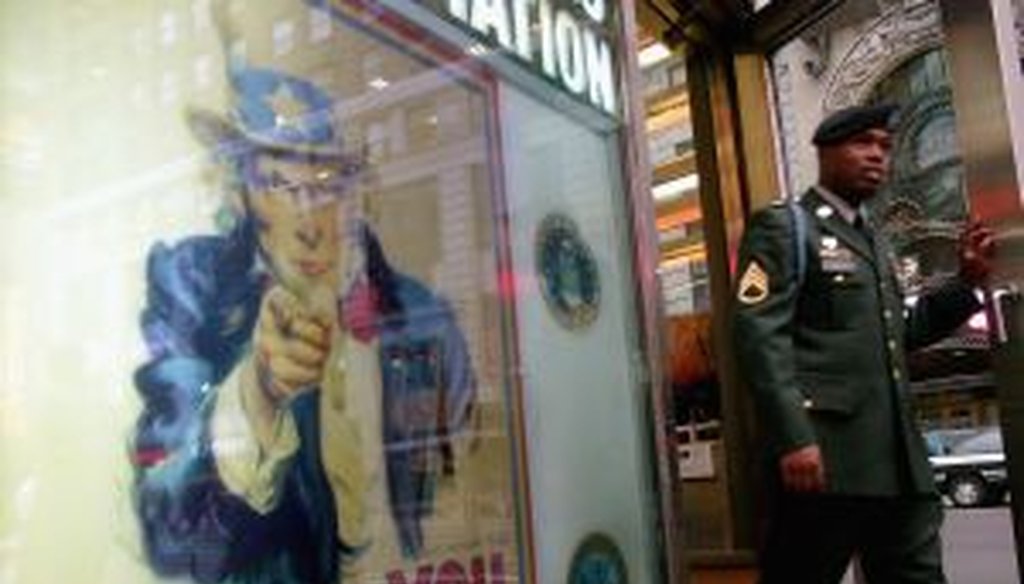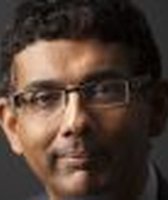Stand up for the facts!
Our only agenda is to publish the truth so you can be an informed participant in democracy.
We need your help.
I would like to contribute

The role of military recruiters on campus have come up at Kagan's nomination hearing.
Sen. Jeff Sessions didn't mince words about being unhappy with Elena Kagan's testimony as a nominee to the U.S. Supreme Court.
At issue was how Kagan handled military recruiters when she was dean of the Harvard law School. On the first day of questioning, Sessions, R-Ala., asked Kagan if she had violated the law when she briefly directed the schools' Office of Career Services not to work with military recruiters. Kagan maintained that the school complied with the law, adding, "Senator, the military at all times during my deanship had full and good access. Military recruiting did not go down."
In an interview later on CNN, Sessions said he thought her answers were less than candid.
"I thought that the points I raised with her, she would acknowledge immediately," Sessions said. "I've been very frustrated with the White House false spin out here about what really happened at Harvard. I was deeply disappointed that she seemed to have followed the White House spin and ignored the reality."
Interviewer Candy Crowley then asked whether the issue should disqualify Kagan. "You know now that she has obviously been opposed to the 'Don't Ask, Don't Tell' policy for some time. You have your version of what went on on the Harvard campus. She has hers. In and of itself, is any of that a disqualifier to sit on the Supreme Court?" Crowley asked.
"Well, she has her version and I have mine, but there is a true version," Sessions said. "And we're going to get to that truth. We're not going to let this slide by, (like) this is my opinion and this is your opinion, and it doesn't make any difference. There are true facts here. And I would say that it raises questions. I don't think she helped herself with that testimony today."
We've been covering this issue ever since President Barack Obama announced Kagan, the current U.S. solicitor general, was his nominee to the court, and we've rated a number of statements on the Truth-O-Meter. Given Sessions' remarks, though, we wanted to explain the military recruitment from the beginning and where the disagreement lies between Sessions and Kagan. We'll also review some of our other Truth-O-Meter rulings on the matter.
The military recruiting issue long predated Kagan's tenure at Harvard Law School. Starting back in the 1970s, some universities barred military recruiters as a way of protesting the war, while others banned them to oppose discrimination against gays and lesbians. In 1979, Harvard Law School adopted a policy that required employers to sign a statement that they did not discriminate based on race, gender or sexual orientation if the employers wanted to recruit on campus through the school's Office of Career Services.
The U.S. military could not sign such a policy because it does not allow gays to openly serve. So for years, the military recruited at Harvard at the invitation of a student organization, the Harvard Law School Veterans Association (now called the Harvard Law School Armed Forces Association).
"The symbolic effect of this special treatment of military recruiters was important, but the practical effect on recruiting logistics was minimal," wrote Robert C. Clark, a professor and dean at Harvard Law School from 1989 to 2003, in an op-ed for the Wall Street Journal on May 11, 2010.
Congress, though, didn't like the fact that universities and law schools were banning military recruiters. In 1994, Rep. Gerald Solomon, R-N.Y., successfully got an amendment passed that would stop Department of Defense research money from going to schools that banned military recruiters.
Still, not all the schools welcomed military recruiters. So Congress gradually started strengthening the Solomon amendment bit by bit, so that it would end most federal funding of any type to a university that didn't treat military recruiters like any other employer. By 2002, universities were faced with real choices about whether to allow recruiters, forego millions in federal funds, or go to court.
Harvard Law School relented under protest. Military recruiters were allowed to use the school's Office of Career Services, but administrators put out statements saying they didn't like it and that they felt the military policy was discriminatory.
Kagan continued that policy when she became dean in 2003, explaining her views in a letter to the school community:
"I abhor the military's discriminatory recruitment policy. The importance of the military to our society -- and the extraordinary service that members of the military provide to all the rest of us -- makes this discrimination more, not less, repugnant. The military's policy deprives many men and women of courage and character from having the opportunity to serve their country in the greatest way possible. This is a profound wrong -- a moral injustice of the first order. And it is a wrong that tears at the fabric of our own community, because some of our members cannot, while others can, devote their professional careers to their country."
Meanwhile, a group of law schools known as the Forum for Academic and Institutional Rights was mounting a legal challenge to the Solomon Amendment.
In January 2004, Kagan and several dozen of her colleagues at Harvard Law filed an amicus brief (sometimes known as a "friend of the court" brief) arguing that the federal government should not be able to withhold funding if the schools applied the same policies to all recruiters. The case was heard by the U.S. Court of Appeals for the 3rd Circuit, which has jurisdiction over district courts in Delaware, New Jersey and Pennsylvania -- but not Massachusetts, where Harvard is located.
In November 2004, the Third Circuit court concluded that "the Solomon Amendment cannot condition federal funding on law schools' compliance with it" and that "FAIR has a reasonable likelihood of success on the merits" of the case. Kagan immediately reinstated the ban on military recruiters’ use of Harvard Law's Office of Career Services. She wrote in a letter to the faculty that the military could still recruit through the Harvard Law School Veterans Association, as it did prior to 2002. The veterans association did assist the military, but they were unable to provide the full range of services as the Office for Career Services.
"We have declined interim options to establish formal liaison relationships, sponsor regular on-campus military recruiting fairs, coordinate interviews extensively, or perform other equivalent functions," the group said in a letter to the school community. "Given our tiny membership, meager budget, and lack of any office space, we possess neither the time nor the resources to routinely schedule campus rooms or advertise extensively for outside organizations, as is the norm for most recruiting events. Moreover, such copious involvement would dramatically constrict our ability to organize other, non-recruiting events."
Sessions has singled out Kagan's actions here for particular criticism because the Third Circuit didn't cover Massachusetts. Sessions said it shows Kagan "violated the law," a claim we rated Barely True. Meanwhile, Sen. Patrick Leahy, D-Vt., said that military recruiting "went on at Harvard every single day throughout the time she was there." We rated that Half True, because the veterans organization was clear that it could not provide the same types of assistance as the Office for Career Services.
The case was then appealed to the Supreme Court, and in the intervening months, the Pentagon threatened to withhold all federal funding to Harvard. So Kagan reversed course and allowed recruiters to again use the Office of Career Services. So the ban on military recruiting during Kagan's tenure as dean lasted one semester in 2005.
Kagan signed on to another amicus brief for the Supreme Court case, but on March 6, 2006, the Supreme Court rejected that circuit court ruling with a resounding 8-0 ruling. The majority opinion, written by Chief Justice John Roberts, rejected the claims of Kagan and the other law professors that the school had the right to enforce non-discrimination policies against the military. "Under the statute, military recruiters must be given the same access as recruiters who comply with the policy," the opinion said. After Kagan was nominated, Sen. John Barrasso said she had taken a position on military recruiting "and the Supreme Court ruled unanimously that she was wrong," a statement we rated True.
During her nomination hearings, Kagan said that her orders did not harm military recruiting at Harvard Law School, and that "military recruiting actually went up" in 2005 when the recruiters were not allowed to use the career services offices. We looked up the numbers, though, and it shows how largely symbolic the Solomon amendment controversy was. Most years, two or three students went into the military. In 2005, it was five students. We rated Kagan's statement Half True.
We'll be watching to see whether this remains an important issue as Kagan's nomination proceeds.
Our Sources
USA Today, Congress pressures schools to accept military recruiters, June 28, 1994
Harvard Law School, Letter: HLS Veterans Association Statement on Military Recruiting, Feb. 18, 2005
Wall Street Journal, "Opinion: Kagan and the Military: What Really Happened," by Robert W. Clark, May 11, 2010
FindLaw, Rumsfeld v. Forum for Academic and Institutional Rights (FAIR), March 6, 2006
The Oyez Project, Rumsfeld v. Forum for Academic and Institutional Rights (FAIR), 547 U.S. ___ (2006), accessed May 6, 2010.
Amicus brief submitted by Harvard Law School Faculty, Rumsfeld v. Forum for Academic and Institutional Rights (FAIR), 2004
SolomonResponse.org, Documents Related to FAIR v. Rumsfeld, May 6, 2010
The Harvard Law Record, Kagan e-mails school, Oct. 6, 2003
U.S. Court of Appeals for the Third Circuit, Rumsfeld v. Forum for Academic and Institutional Rights (FAIR)
New York Times, "Potential Court Pick Faced Dilemma at Harvard," by Katharine Q. Seelye, May 6, 2010
Boston Globe, "In Kagan stance on military, a complex history," by Tracy Jan and Mark Arsenault, May 12, 2010











































